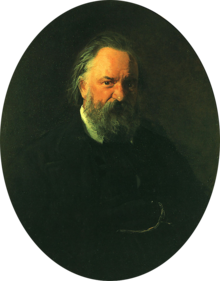Alexander Hertsen
| Alexander Herzen | |
|---|---|

Portrait of Herzen by Nikolai Ge (1867)
|
|
| Born |
Aleksandr Ivanovich Herzen April 6, 1812 Moscow, Russia |
| Died |
January 21, 1870 (aged 57) Paris, France |
| Era | 19th century philosophy |
| Region | Western Philosophers |
| School | Agrarian collectivism |
|
Main interests
|
Russian Politics, Economics, class struggle |
|
Notable ideas
|
Agrarianism, Collectivism, Populism, Socialism |
Aleksandr Ivanovich Herzen (Russian: Алекса́ндр Ива́нович Ге́рцен; April 6 [O.S. 25 March] 1812 – January 21 [O.S. 9 January] 1870) was a Russian writer and thinker known as the "father of Russian socialism" and one of the main fathers of agrarian populism (being an ideological ancestor of the Narodniki, Socialist-Revolutionaries, Trudoviks and the agrarian American Populist Party). With his writings, many composed while exiled in London, he attempted to influence the situation in Russia, contributing to a political climate that lead to the emancipation of the serfs in 1861. He published the important social novel Who is to Blame? (1845–46). His autobiography, My Past and Thoughts, (written 1852-1870) is often considered the best specimen of that genre in Russian literature.
Herzen (or Gertsen) was born out of wedlock to a rich Russian landowner, Ivan Yakovlev, and a young German Protestant woman, Henriette Wilhelmina Luisa Haag from Stuttgart. Yakovlev supposedly gave his son the surname Herzen because he was a "child of his heart" (German Herz).
He was first cousin to Count Sergei Lvovich Levitsky, considered the patriarch of Russian photography and one of Europe's most important early photographic pioneers, inventors and innovators. In 1860, Levitsky would immortalize Herzen in a famous photo capturing the writer's essence and being.
Herzen was born in Moscow, shortly before Napoleon's invasion of Russia and brief occupation of the city. His father, after a personal interview with Napoleon, was allowed to leave Moscow after agreeing to bear a letter from the French to the Russian emperor in St. Petersburg. His family accompanied him to the Russian lines.
...
Wikipedia
